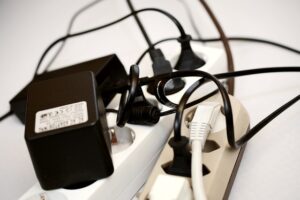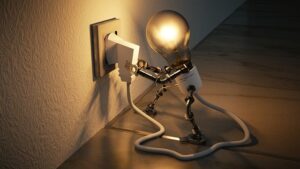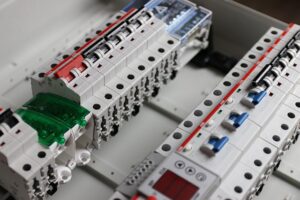When a circuit breaker trips, it protects your device and circuit; it’s just doing its job unless it is damaged.
Table of Contents
What would cause a circuit breaker to keep tripping?
Overloaded Circuit:
One common reason for a circuit breaker to trip is an overloaded circuit. This happens when too many devices are connected, causing the circuit to draw more current than it’s designed to handle. As a result, the breaker overheats and trips to protect the system.

Electrical Short Circuit:
Another reason for the breaker tripping is the electrical short circuit. A short circuit occurs due to low insulation resistance.
When the positive and negative (live and neutral) terminal connects with each other in the absence of any resistance. This causes an unimpeded flow of electricity. A large amount of current flows through a breaker that causes tripping.
It’s important to determine if the tripping is caused by a short circuit. The answer is simple: if the breaker trips instantly after resetting, it’s likely due to a short circuit.
If a circuit breaker keeps tripping immediately after you reset it, this is likely due to a short circuit.
- Fuses blowing repeatedly or circuit breakers tripping frequently are common signs.
- A blown fuse often explodes, while a circuit breaker trips instantly.
- If you replace a fuse with the correct rating and it blows again, it confirms a short circuit.
- If a circuit breaker trips immediately after being reset, it could indicate either a short circuit or a faulty circuit breaker.
Read my detailed article about Electrical short circuits, why is it dangerous?
Ground Fault:
Another reason that causes the circuit breaker tripping is the ground fault. A ground fault is a type of short circuit when a hot wire comes in contact with the ground or any other type of metal.
The ground fault causes an increase in the flow of current. It causes the circuit breaker to heat up and as a result, circuit breaker tripping occurs.
Some ground faults are not detectable by normal MCB. So it’s recommended to use GFCI (ground fault circuit interrupter) This is better for human safety as this breaker can detect small milli-amperes and trips before a shock happens. Read my article on my other site: Surge Protectors and GFCI Outlets: Can They Safely Coexist?
Arc Fault:
When fluctuations or sparking happen between two wire connections, arc faults occur. This can sometimes be caused by loose screws at a connection point. In such cases, using an Arc Fault Circuit Interrupter (AFCI) is recommended.
An AFCI is a type of circuit breaker designed to detect early wiring problems and trip to stop the flow of excessive current, preventing potential hazards.
Bad Circuit Breaker:
Sometimes, the circuit and loads are perfectly fine, but the breaker still trips randomly. This usually means the circuit breaker is faulty. Like any device, breakers have a lifespan, and when they wear out, they need to be replaced.
The circuit breaker keeps tripping immediately
If your circuit breaker keeps tripping immediately after resetting, it signals a serious electrical issue that needs urgent attention. Here’s how to address it:
Steps to Troubleshoot:
-
Identify the Problem Circuit: Locate the specific circuit causing the repeated tripping to narrow down the issue.
-
Disconnect All Appliances: Unplug all devices connected to the tripping circuit. If the breaker stays on, one of the appliances might be faulty.
-
Inspect for Short Circuits or Ground Faults: Check the wiring, outlets, and switches for damage, exposed wires, or moisture. These are common causes of short circuits or ground faults.
-
Check the Breaker: Examine the circuit breaker for signs of wear, overheating, or damage. Replace it if necessary.
-
Call a Professional: If the problem persists or you cannot identify the cause, contact a licensed electrician. They can safely diagnose and fix the issue.
Safety Tip:
Always prioritize safety when dealing with electrical problems. If you’re unsure or uncomfortable with the process, seek professional assistance immediately. Electrical issues can be complex and dangerous, so it’s better to leave them to experts to protect your home and family.
Can a circuit breaker trip for no reason?
A breaker will trip for no reason if it malfunctions. A breaker will trip when a short circuit occurs on an electrical circuit, causing sparks, popping sounds, or smoke to be produced.
A loose connection, slipping wire, or even damage from animals chewing on cables could cause this.
If you didn’t find any faults like a short circuit, overload, or lost connection, your circuit breaker might be old and unable to carry current anymore.
In other words, it has become bad. It would be best if you replaced it for the circuit to continue operating.
Why is the Main circuit breaker tripping?
The main breaker can trip for a variety of reasons. Whether it be a lightning strike, a power surge from the utility company, or an overload to the electrical panel, the main breaker can be tripped due to any of these factors.
Furthermore, the main circuit breakers can trip simply because they’re worn out. There might be a situation when a branch circuit breaker fails and is no longer capable of tripping as designed, which may result in the main breaker tripping to provide secondary safety shutoffs in the event that the individual circuit breaker fails.
Furthermore, If the total load demand becomes too much or if there is any significant issue with the electrical system, the main breaker cuts off electricity to the entire house.
These issues often entail brief power spikes, although it may be necessary to detect system issues occasionally. The main circuit breaker “tripping” is somewhat uncommon since often, individual circuit breakers trip long before the main breaker has to shut down.
Why do my breakers trip when it rains?
The main cause of a breaker’s trip after the storm is a short circuit brought on by water.
Due to heavy rain, the electrical wire isolation may deteriorate after water exposure, causing a short circuit. Improper panel box installation might be another reason your circuit breaker tripped during the storm.
Rainwater may get into your circuit in a number of ways if the main line is not installed properly. Water may enter your wiring conduits through the wire leading to the meter and electrical circuit. It’s also conceivable that the conduit or hose you used to install your main line will let water through.
Because of this, if the breaker box is in the basement, water may wet your circuit. The worst possible scenario for your house is a wet circuit breaker.
A wet circuit is dangerous because you might get electrocuted in addition to the electrical problems it can create.
Will a breaker trip if wires touch each other?
Yes, a circuit breaker can trip if wires touch each other, especially if the wires create a short circuit.
When wires make direct contact or create a path with low resistance between the hot and neutral wires or between the hot wire and the ground, a short circuit occurs.
This causes a sudden increase in electrical current, exceeding the circuit breaker’s capacity and triggering it to trip.
The purpose of a circuit breaker is to protect the electrical system and connected devices from potential damage caused by overcurrent situations like short circuits. When the circuit breaker trips due to a short circuit, it interrupts the flow of electricity and prevents further damage to the wiring, appliances, and other electrical components.
To prevent wires from touching and causing a short circuit, it’s essential to follow proper wiring practices, including:
- Using appropriate wire connectors and junction boxes to secure and protect wire connections.
- Insulating exposed wires to prevent contact with other wires or conductive materials.
- Maintaining proper wire spacing and organization to minimize the risk of accidental contact.
If you suspect that wires are touching or if you experience frequent circuit breaker trips, it’s essential to consult a licensed electrician to inspect your electrical system.
A professional electrician can identify any potential wiring issues, troubleshoot the cause of the tripping, and ensure the safety and functionality of your electrical system.
Why is the circuit breaker not tripping?
The circuit breaker may not trip if it malfunctions due to (an entirely mechanical problem, or sustains partial or total damage ) Occasionally, a circuit breaker will not trip in circumstances of fault like a short circuit, or overload, indicating it is bad and must be replaced.
It is also possible for the cause of the problem to be entirely mechanical, which means there may be a physical switch that is stuck in the “on” position.
The circuit breaker may also malfunction without tripping if it sustains partial or total damage. On occasion, a power failure occurs as internal components melt. To ensure appropriate operation, examine the circuit breaker and replace the broken one.
Signs of damaged/ faulty circuit
- Inspect the circuit breakers for any burning odors.
- If the panel feels hot to the touch, the circuit is either broken or overloaded.
- If the circuit is beyond its prime or is too old, replace it with a new one.
- Parts become melted or scorched due to heat.
- The item is defective if it trips off more frequently while gadgets draw more power.
What happens if a breaker doesn’t trip in faults condition?
If a circuit breaker fails to trip during a fault condition, it can lead to serious hazards, including:
Potential Risks:
- Overheating and Fire: Excessive current from an overload or short circuit can cause wires and insulation to overheat, potentially igniting a fire if the breaker doesn’t interrupt the current.
- Equipment Damage: Connected devices and appliances may sustain irreparable damage due to the unregulated flow of excessive current, resulting in costly repairs or replacements.
- Electrocution Risk: Without proper circuit protection, the risk of electric shock or electrocution increases, particularly if someone touches live wires or faulty equipment.
- System Damage: Prolonged overloading or short circuits can severely damage the wiring, panels, and other components of the electrical system, leading to extensive repairs and safety risks.
Preventive Measures:
- Schedule Regular Inspections: Have a qualified electrician inspect your electrical system periodically to ensure all components, including circuit breakers, are functioning correctly.
- Test Circuit Breakers: Perform routine tests to confirm the breakers trip as intended during overloads or faults.
- Upgrade to Advanced Devices: Install safety devices like Ground Fault Circuit Interrupters (GFCIs) and Arc Fault Circuit Interrupters (AFCIs) for enhanced protection against faults.
Read my detailed article 8 Essential Best Practices for Electrical Maintenance in Industrial Settings
Final Tip:
Regular maintenance and prompt attention to electrical issues are critical for preventing hazardous situations. These steps can ensure the safety, reliability, and longevity of your property’s electrical system.
Don’t Leave Empty-Handed!
Install my Free Android App on Google Play:
Electrical Cables Most Common Tables “Cables Tables”
And, my Electrical Calculations App “Fast Electrical Calculator”
Discover more great content by subscribing to My channel
Looking to stay ahead of the game in the world of electrical engineering? Subscribe to my YouTube channel and gain access to exclusive content you won’t find anywhere else!
The staff I recommend
(Amazon Affiliate Links to products I believe are high quality):
- Economy 120 Volt/60Hz AC Power Source – Step-Down Voltage & Frequency Converters 1800W
- UNI-T Digital Multimeter Tester UT139C
- 50-Amp Extension Cord for RV “100ft”
- Voltage Stabilizer 110/220v
- Hair Dryer “best selling“
- TOSHIBA EM131A5C-BS Countertop Microwave Ovens
Disclaimer: This contains affiliate links to Amazon products. I may earn a commission for purchases made through these links.


